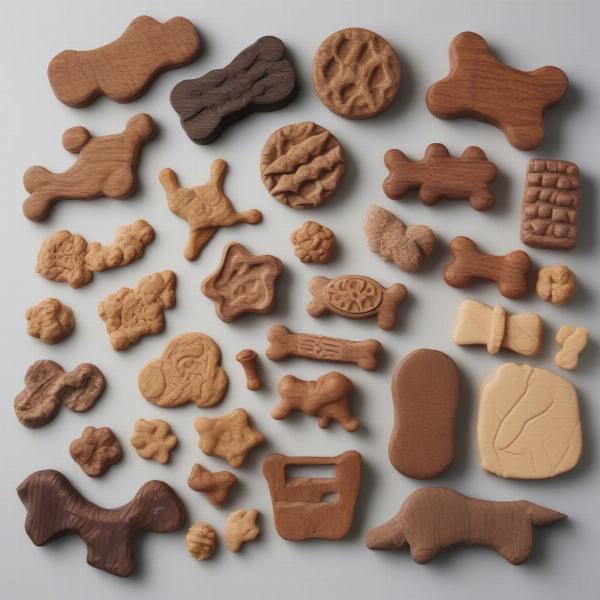Rosewood dog treats are a relatively new addition to the pet treat market, and as such, information about them can be limited. This guide aims to delve into what we know about rosewood as an ingredient in dog treats, discuss potential benefits and risks, and help you make informed choices for your canine companion.  Different types of rosewood dog treats
Different types of rosewood dog treats
Understanding what goes into your dog’s treats is crucial for their health and well-being. While rosewood is known for its beautiful aroma and use in furniture, its application in dog treats raises questions. Are they safe? Are they beneficial? Let’s explore these questions together.
What are Rosewood Dog Treats?
Rosewood dog treats are typically made from the wood of the rosewood tree, often combined with other ingredients to create a palatable and appealing chew for dogs. It’s important to note that “rosewood” can refer to several different tree species, and not all are suitable for canine consumption. Always verify the specific species used in the treat. Some manufacturers may use the term “rosewood” loosely to describe treats with a rose-like scent, even if they don’t contain actual rosewood.
Due to the limited research on rosewood for canine consumption, it’s essential to approach these treats with caution. Consult your veterinarian before introducing rosewood treats, especially if your dog has any existing health conditions.
Potential Benefits and Risks of Rosewood Dog Treats
The benefits of rosewood dog treats are still being explored. Some proponents suggest that the hard texture can help with dental hygiene by scraping away plaque and tartar. Others believe the natural wood can provide beneficial fibers. However, scientific evidence to support these claims is currently lacking.
On the other hand, the potential risks are more clearly defined. Some rosewood species contain toxic compounds that could be harmful to dogs if ingested. Additionally, the hardness of the wood can pose a choking hazard, particularly for smaller dogs or aggressive chewers. Splintering is also a concern, which could cause injury to the mouth, throat, or digestive tract.
Choosing Safe and Appropriate Dog Treats
While the novelty of rosewood dog treats might be tempting, it’s always best to prioritize your dog’s safety. Opt for treats with proven safety records and clear ingredient lists. Look for options recommended by veterinarians or reputable dog organizations.
Alternatives to Rosewood Dog Treats
Plenty of safe and healthy alternatives to rosewood treats are available. Dental chews made from digestible materials, such as rawhide or bully sticks (under supervision), can offer similar dental benefits. Natural treats like carrots, apples, and sweet potatoes can provide healthy fiber and nutrients.
Are Rosewood Treats Right For Your Dog?
Given the potential risks and the lack of concrete evidence supporting their benefits, proceeding with caution with rosewood dog treats is best. Always discuss any new treat with your veterinarian before giving it to your dog. They can assess your dog’s individual needs and health status and advise whether rosewood treats are a suitable choice.
Conclusion
Rosewood dog treats present a complex issue. While they offer potential benefits like dental hygiene support, the lack of research and potential risks associated with certain rosewood species require careful consideration. Prioritize your dog’s safety and well-being by opting for treats with proven safety records and consulting your veterinarian before introducing new items to their diet.
FAQ
- Are all rosewood trees safe for dogs? No, not all rosewood species are safe. Some contain toxins that could harm dogs.
- Can rosewood treats help clean my dog’s teeth? While the hard texture might offer some scraping action, there’s no conclusive scientific evidence to support significant dental benefits.
- What should I do if my dog chokes on a rosewood treat? Seek immediate veterinary attention.
- Are there any known allergic reactions to rosewood in dogs? Information on allergic reactions to rosewood in dogs is limited. Consult your vet if you notice any unusual symptoms after your dog consumes a rosewood treat.
- What are some safer alternatives to rosewood treats? Dental chews, fruits, and vegetables can be safe and healthy alternatives.
- Where can I find more information about safe dog treats? Consult your veterinarian or reputable dog organizations for reliable information.
- Should I give my puppy rosewood treats? Puppies are particularly vulnerable to choking hazards, so it’s best to avoid rosewood treats for puppies.
ILM Dog is your trusted international resource for comprehensive dog care and training information. We offer expert guidance on various topics, from breed selection and health care to nutrition and behavior. For personalized advice and support, reach out to our team at [email protected] or call us at +44 20-3965-8624. Visit ILM Dog today to learn more about how we can help you provide the best possible care for your canine companion.